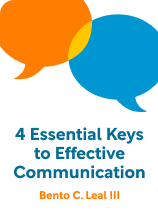

This article is an excerpt from the Shortform book guide to "4 Essential Keys to Effective Communication" by Bento C. Leal III. Shortform has the world's best summaries and analyses of books you should be reading.
Like this article? Sign up for a free trial here.
Do you want to show others how you really feel? What are some ways to express empathy?
When someone opens up to you, you might not know how to respond at first. Thankfully, Bento C. Leal’s book 4 Effective Keys to Effective Communication demonstrates ways to express yourself empathetically to other people.
Find out how to express yourself with empathy so there’s no confusion or misunderstanding.
Express Yourself With Empathy
Once you’ve listened to another person, you must be able to respond to what they’ve said and express yourself effectively. Leal argues that doing so requires you to learn specific ways to express empathy. Expressing yourself with empathy means clearly and accurately vocalizing your emotions and thoughts in a way that makes the other person willing to listen.
Leal explains that failing to express yourself with empathy often leads to misunderstandings or offenses that can damage relationships. This issue is especially prevalent when people are upset or discussing sensitive topics. When emotions are running high, people tend to speak before thinking and can say offensive, confusing, or inaccurate things.
For example, if you’re angry at your partner for continuing to ignore their chores, your strong emotions might lead you to yell at them and accuse them of being lazy. This might cause your partner to resent you and ultimately damage your relationship.
| Life-Alienating Communication—the Opposite of Empathetic Expression In Nonviolent Communication, Marshall B. Rosenberg also emphasizes the importance of expressing ourselves with empathy and compassion. And like Leal, Rosenberg explains that if we fail to do so, we’re likely to engage in harmful forms of communication. Rosenberg calls these harmful forms of communication “life-alienating communication,” and he explains that they’re the opposite of empathetic expression. In other words, they produce the effects that Leal’s recommendations seek to avoid—they push others away, make them not want to listen to us, and ultimately damage relationships. Rosenberg explains that if we don’t take the time to formulate an accurate and empathetic response before speaking, especially when emotions are running high, we’re likely to engage in one of the following forms of life-alienating communication: Moralistic judgments. This is when we blame, criticize, diagnose, label, or insult others based on our own judgment of right and wrong. Comparisons. Any time we make a comparison between ourselves and others, we’re essentially weighing who’s “better” and who’s “worse.” Denial of responsibility. This is when we blame outside factors (situations, people, and so on) for our thoughts and feelings instead of taking responsibility. Making demands. When we demand something of someone else, we imply that there will be consequences if they don’t comply. Threats never result in productive outcomes. |
Practice #1: Get Organized
Before you speak, Leal recommends taking a moment to sort out what you’re thinking, how you’re feeling, and what you want to get from the conversation. When we speak before clarifying these factors, our strong emotions might make us confused about what we really want and cause us to act dramatically, possibly saying things that are hurtful or that we don’t really mean. Acting in this way will make the other person unreceptive to what we’re saying and will likely produce an unsatisfactory end to the conversation. In contrast, planning helps us to express exactly what we need the other person to hear in a way that’s easy for them to understand and that triggers productive conversation.
For example, if your partner upsets you, your strong emotions might flood you with the urge for revenge when rationally, you want to solve the problem and achieve peace. If you don’t take a second to plan your response, these emotions might cause you to accuse or yell at your partner rather than speaking to them with empathy, triggering a major fight. If you’d taken a second to plan your response before speaking, you could have avoided this.
Practice #2: Express Yourself Clearly and Respectfully
Once you’ve determined what you want to say to the other person, Leal recommends expressing yourself in a way that makes your thoughts, feelings, and needs easy for the other person to understand and respond to.
To do this, explain your points one at a time. Furthermore, focus the conversation on your perspective of the situation by using the “I” pronoun rather than the more critical-sounding “you.” For example, say “I feel…” rather than “you did…”. You’ll avoid making accusations and assumptions that might make the other person uncomfortable and cause them to disengage from the conversation.
Leal argues that the best way to express yourself clearly and respectfully is to follow a set formula (what he calls an “XYZ Statement”). First, explain the issue in question. Then, explain your perception of the issue. Finally, explain how the issue makes you feel. For example, “Yesterday, my boss called out the quality of my work in front of the office, and it made me think they wanted to publicly embarrass me. It made me feel really ashamed and a little angry at them.”
Practice #3: Continue the Conversation
The final practice of expressing yourself with empathy is allowing the other person to respond and then continuing the discussion until everyone is satisfied. Leal notes that this practice ensures that the conversation comes to a satisfactory end—both parties have fully expressed themselves and fully understand each other. If the discussion is about a problem that needs to be solved, continuing the conversation will ensure that a solution is identified.
To continue the conversation until its natural end, switch back and forth between listening and expressing yourself and follow the practices necessary to perform these abilities. At the end of the conversation, thank the other person for listening.

———End of Preview———
Like what you just read? Read the rest of the world's best book summary and analysis of Bento C. Leal III's "4 Essential Keys to Effective Communication" at Shortform.
Here's what you'll find in our full 4 Essential Keys to Effective Communication summary:
- How to avoid the two most damaging communication faux pas
- How to listen and express yourself with empathy
- Why having empathy for others starts with seeing the worth in yourself






